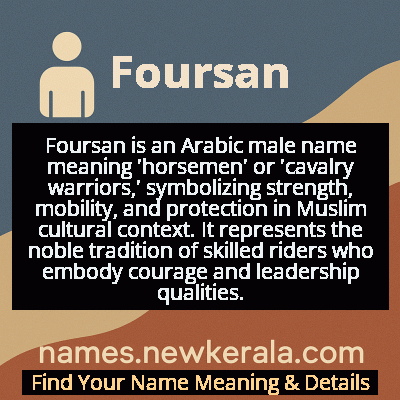Foursan Name Meaning & Details
Origin, Popularity, Numerology Analysis & Name Meaning of Foursan
Discover the origin, meaning, and cultural significance of the name FOURSAN. Delve into its historical roots and explore the lasting impact it has had on communities and traditions.
Name
Foursan
Gender
Male
Origin
Muslim
Lucky Number
4
Meaning of the Name - Foursan
Foursan is an Arabic male name meaning 'horsemen' or 'cavalry warriors,' symbolizing strength, mobility, and protection in Muslim cultural context. It represents the noble tradition of skilled riders who embody courage and leadership qualities.
Foursan - Complete Numerology Analysis
Your Numerology Number
Based on Pythagorean Numerology System
Ruling Planet
Uranus (Rahu)
Positive Nature
Strong sense of order, loyal, practical, and disciplined.
Negative Traits
Stubborn, overly serious, rigid, and prone to feeling restricted.
Lucky Colours
Blue, gray.
Lucky Days
Saturday.
Lucky Stones
Blue sapphire.
Harmony Numbers
1, 7, 8.
Best Suited Professions
Managers, engineers, accountants, organizers.
What People Like About You
Dependability, discipline, practicality.
Famous People Named Foursan
Foursan al-Mansouri
Military Commander
Led successful cavalry campaigns during the Ayyubid period
Foursan ibn Khalid
Equestrian Scholar
Authored influential treatises on horsemanship and cavalry training
Foursan al-Harithi
Tribal Leader
United desert tribes through superior horsemanship
Foursan Ahmed
Modern Equestrian
International champion in endurance riding
Name Variations & International Equivalents
Click on blue names to explore their detailed meanings. Gray names with will be available soon.
Cultural & Historical Significance
In Bedouin and tribal contexts, the name carries additional layers of meaning, representing mobility, freedom, and the ability to protect one's community. The horse rider in desert cultures was not just a warrior but a navigator, protector, and symbol of tribal honor. This cultural heritage makes Foursan a name that connects modern bearers to centuries of Islamic military tradition, nomadic wisdom, and the romantic ideal of the noble warrior astride his trusted steed, embodying both physical strength and moral character.
Extended Personality Analysis
Individuals named Foursan are typically perceived as possessing strong leadership qualities, courage, and a natural inclination toward protection and responsibility. They often exhibit the symbolic characteristics of horsemen—mobility of thought, strategic thinking, and the ability to navigate challenging situations with grace under pressure. Their personality tends to blend traditional values with forward-thinking approaches, much like the horseman who respects ancient riding techniques while adapting to new terrain.
These individuals usually demonstrate loyalty to their communities and families, mirroring the historic bond between rider and horse. They are often action-oriented rather than contemplative, preferring to lead by example and take initiative in difficult circumstances. The name suggests a person who values freedom and independence but understands these come with responsibility toward others. Their strength is typically balanced with wisdom, as the best horsemen throughout history combined physical prowess with strategic intelligence and emotional control.
Modern Usage & Popularity
In contemporary times, Foursan remains a respected though uncommon name primarily used in Arab and Muslim communities with strong connections to their equestrian heritage. The name has seen a modest resurgence in regions like Saudi Arabia, Jordan, and the Gulf states where traditional Bedouin values are being rediscovered and celebrated. While not among the most popular names, it carries significant cultural weight and is often chosen by families wishing to honor military or equestrian traditions. Modern usage reflects a balance between preserving cultural identity and adapting to contemporary naming trends, with the name appearing more frequently in educated, urban families who value both tradition and individuality.
Symbolic & Spiritual Meanings
Symbolically, Foursan represents much more than literal horsemen—it embodies the virtues of leadership, mobility, strength, and protection. The horseman symbolizes the ability to move between worlds, connecting different realms and perspectives while maintaining one's core identity. Metaphorically, it suggests someone who can 'ride through' challenges and navigate complex situations with skill and determination. The name also carries connotations of nobility and chivalry, reflecting the Islamic tradition of futuwwa (spiritual chivalry) where physical prowess was meant to serve higher moral purposes. In a broader sense, Foursan symbolizes the journey through life with purpose, control, and the ability to protect what one values most.

